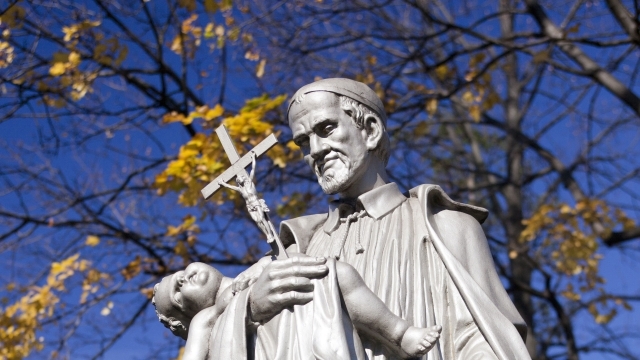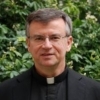

Vincentian Center for Church and Society
- Home
- Who We Are
- Vincentian Center for Church and Society
The Vincentian Center for Church and Society (VCCS) at St. John’s University has deep roots in the Catholic Church. While many of the Center’s activities link the University to local communities and the Church of Metropolitan New York, its reach extends to numerous national and international projects.
About The Vincentian Center for Church and Society
The Vincentian Center for Church and Society at St. John’s University originated in 1994 and continues to animate university-wide consciousness of the Vincentian charism, to encourage and support academic ventures, especially those related to social justice, and to serve and collaborate with the greater church and community in the spirit of Ex Corde Ecclesiae. Working with and supporting faculty, the Center has deep roots in the Catholic Church serving the community at large with a number of educational programs. It is the site of many academic and cultural events, and the home of the Vincentian Chair of Social Justice.
While many of the Center’s activities link the University to local communities and the Church of Metropolitan New York, its reach extends to numerous national and international projects.
Contact and Connect with Us!
St. John’s University
Vincentian Center for Church and Society
8000 Utopia Parkway
Sun Yat Sen, Room 122
Queens, NY 11439
718-990-1612
[email protected]

Rev. Patrick J. Griffin, C.M.
Executive Director
718-990-6311
[email protected]
Rev. Patrick J. Griffin, C.M., a Brooklyn, NY, native, was ordained a Vincentian priest in 1979. After ordination, he completed a doctorate in Biblical Studies and taught at various universities and seminaries.
From 1993 through 1999, he worked in Rome, Italy, as the Econome General of the Congregation of the Mission (the Vincentians). From 2010 through 2014, Fr. Griffin ministered in Paris as the Director General of the Daughters of Charity.
In March of 2014, Fr. Griffin returned to St. John’s University in Queens, NY, where he assumed his current position as the Executive Director for the Vincentian Center for Church and Society.

Jennifer Guzowski
Secretary
718-990-6758
[email protected]
Our Facebook
Our Instagram
Our YouTube
Mission
The Vincentian Center for Church and Society’s mission is to:
- Develop Vincentian expertise;
- Promote experiences and develop materials that underscore the University’s Vincentian vision and spirit;
- House the Vincentian Chair of Social Justice;
- Sponsor the Religion and Science Dialogue;
- Develop academic and cultural programs for the University and the outlying community;
- Develop curriculum and offer educational programs for Church personnel in areas like management, evangelization, marketing and advocacy;
- Encourage and facilitate interdisciplinary research and reflection on Catholic Social Teaching, social justice, poverty, advocacy and the relationship between science and religion;
- Provide facilitation and consulting services to Church organizations;
- Provide academic expertise and presence to the Mission of the Holy See to the United Nations.
Goals
The Vincentian Center for Church and Society serves as a link between St. John’s University, the Church, service organizations and the community at large. The goal is to:
- Encourage rigorous social and theological reflection on issues of mutual concern to the Church and the University;
- Facilitate the study of the causes of and the alleviation of poverty;
- Promote interdisciplinary research and programs;
- Develop curricula and other educational programs in management, evangelization and other subjects to enhance the role of Church personnel and Church organizations;
- Organize and sponsor academic and cultural events focused on human values, human rights, and the relationship between science and religion;
- Initiate forums, think-tanks, roundtables and conferences to educate and encourage Church, academic and community leaders and service providers;
- Sponsor events directed at public policy analysis and service advocacy; maintain and publish information on University service to the greater community;
- Maintain relationships with University faculty in areas related to poverty, social justice, religion and science, community service advocacy, and other disciplines;
- Stimulate interest in and enthusiasm for the Vincentian spirit and tradition within the University;
- Produce and distribute materials on Vincentianism, social justice and poverty;
- Enable the Mission of the Holy See to the United Nations to function effectively through University expertise and presence.
Vincentian Chair of Social Justice
The Vincentian Chair of Social Justice was established in 1994 in response to the recommendation Pope John Paul II made to delegates of the Congregation of the Mission’s 37th General Assembly in Rome (1986): to search out more than ever with boldness, humility and skill the causes of poverty and encourage short and long-term solutions. University scholars and research fellows work with the Vincentians in their charism “to evangelize the poor” and encourage efforts to build a society based on Gospel values and the Vincentian tradition.
Twenty years ago, in the encyclical Centesimus Annus, Pope John Paul II examined 100 years of CST in light of the rapid globalization of the 20th century. Twenty-five years ago, the US Catholic Bishops published Economic Justice for All. In that document, the Bishops directed society to shape economic life by answering three questions:
- What does the economy do for people?
- What does it do to people?
- And how do people participate in it?
As we enter the second decade of the 21st century, these documents challenge us to live in solidarity and practice subsidiarity as we attempt to overcome the great inequities in wealth, income, consumption and access to resources throughout the world. The Vincentian Chair for Social Justice conference examines the conditions and attitudes necessary for the common good—“the sum total of social conditions which allow people, either as groups or as individuals, to reach their fulfillment more fully and more easily.” (Gaudium et Spes,S 26 S. 1.)
“Love for others, and especially for the poor, is made concrete by promoting justice”
– John Paul II, Centesimus Annus
Through the perspective of Catholic Social Thought and the Vincentian Tradition, participants will view the role and responsibility of governments, civil society and businesses, as well as individuals, to eradicate poverty and advance sustainable prosperity with intergenerational justice for all.
Vincentian Research Fellows
In 2000, the Vincentian Center for Church and Society created the Vincentian Research Fellows’ Program to provide an interdisciplinary forum for faculty whose research interests advance the social justice orientation of St. John’s University, and to encourage research, reflection and programming on issues of poverty. In addition, the Center also elected to name Fellows whose scholarship could advance clerical formation and relate religion and science. These foci reflect the spirit and accomplishments of St. Vincent de Paul (1581-1660). The Fellows arrange for educational programs for the University community and the metropolitan area and assist in the planning and sponsorship of the Center’s biennial Poverty Conference. To be named a Center Fellow, a professor must be recognized for both effective teaching and scholarly research and must be recommended by his/her respective Dean. Tenured and untenured professors are eligible and are named for a two-year term. After the two years, they may be invited to continue serve as Senior Fellows and advisors to the Vincentian Center.
Research Definition
In keeping with the Vincentian tradition of concern for the poor and marginalized in society, the Vincentian Center for Church and Society conducts interdisciplinary research aimed at identifying and responding to the causes of poverty and social injustice, particularly in urban areas. The Center encourages solutions which are adaptable, effective and concrete, and which embody the spirit of compassion and service exemplified by the life of St. Vincent de Paul. The Center supports research which can enlighten public discourse on issues of justice and poverty and which can contribute to the development of effective public policy initiatives.
VCCS Programs
In an intensive, supportive, five-day residential program, participants who have already developed “survival skills” and have conversational ability in English focus on these goals: Church Development in the United States, Sociological Issues, Counseling and Self-Care, Priest as Leader, Team Member, and Collaborator, Church Structure and Collaboration, Interpersonal Communications, Pastoral Communications, Time Management, Immigration and Legal Issues, Liturgical Sharing, Relationships, and Understanding Boundaries.
The Chinese Leadership Initiative Program is an annual, four-week leadership development program held on the campuses of St. John’s and DePaul University. Its participants are 20-25 priests or sisters from China who come to know the American Church from many different perspectives. St. John’s provides accommodations, meals, hospitality and some light programming.
The program is extended to faculty who joined St. John’s during the current academic year, as well as those who have been active as faculty for more than a year but have not been able to attend this session. The program offers an opportunity to gain knowledge about the Vincentian tradition and mission and at the same time to meet faculty, both new and seasoned, from across the entire University.
The seminars are part of a formalized and standardized program of Orientation and Continuing Education of Faculty, with four required sessions and four individually chosen events leading to a Mission Certificate.
The four required sessions are:
- “St. John’s University: Its Mission and Identity”– a brief overview presented during orientation week in August
- “The Vincentian Tradition and the Academic Mission of St. John’s”
- “Catholic Social Teaching and Higher Education”
- “From Pope John Paul II to Pope Francis: The Modern Catholic University”
In addition to the four sessions, faculty seeking certification will be asked to select four mission-oriented events over a two-year period to complete their Mission Certificate requirements.
Founder’s Week at St. John’s University honors St. Vincent DePaul (1581-1660), the founder of the Congregation of the Mission, the sponsoring congregation of St. John’s University founded in Brooklyn in 1870.
Inaugurated in 1995, the Week provides opportunities for all the University constituencies to reflect on the Vincentian legacy and identity of the University and to discover new ways in which Vincent’s spirit continues to motivate and inspire. A calendar of events would demonstrate the scope and focus of the week as it holds forth lectures, a Vincentian Convocation, a Service Day, and a Mass for the Solemnity of St. Vincent de Paul. To these can be added other events that touch each of the University campuses and locations.
The University created Founder’s Week as a gift to celebrate and expand our knowledge about Vincent. Knowledge of his life will enrich our collaborative mission and affirm both our professional and personal values as a Catholic and Vincentian institution of higher learning.
The Vincentian Center for Church and Society and the Vincentian Research Fellows, through the sponsorship of the Vincentian Chair of Social Justice, host a biennial conference focused on an aspect of poverty emphasizing integral human development of the individual and our society. The Vincentian charism and Catholic Social Thought are two major focal points. In addition to St. John’s faculty, personnel and students, the conference welcomes participation from external partners such as religious leaders, service-providers, community organizers, and faculty from other institutions.
Conference Goals
- Provide an interdisciplinary examination of homelessness, including perspectives from the disciplines of theology, economics, health, mental health, law and the social sciences.
- Identify concrete actions for individuals, communities, states and national actors to address homelessness.
- Identify strategies that aim to integrate Catholic Social Thought and the preferential option for the poor into discourse and policy decision-making.
Each of these goals reflects the Catholic and Vincentian character of St. John’s University in the service of its Mission.
VCCS News
The Soul of Catholic Education: Lecture Calls to Integrate Faith, Reason, and Service
Dr. King was the second speaker in the 2025–26 Vincentian Chair of Social Justice Lecture Series. His lecture, “The Soul of Catholic Education,” continued the series theme, “The Catholic Intellectual Tradition,” and was held on October 9 in the D’Angelo Center on St. John’s University’s Queens, NY, campus.
Founder’s Week Celebration Lights Hearts on Fire at St. John’s
St. Vincent de Paul was a practical man of action. He was a master at building teams composed of the most talented people suited to his cause. His passion motivated others; he set hearts on fire.
Vincentian Bishop Highlights Deep Connection Between St. John’s University and St. Vincent de Paul
St. Vincent de Paul had a “dual vision” of eyes and heart. He created and organized support networks to care for those in need materially, physically, and spiritually.
